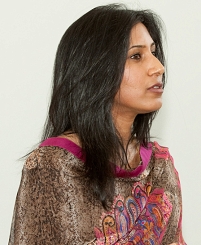Erstellt am: 24. 8. 2010 - 15:22 Uhr
Pakistan's mega-disaster
It’s hard to conceive that, one month after it began, Pakistan’s flood disaster is still increasing in terms of its scale and the number of people affected. Yet it is and the longer it goes on the greater the long term consequences for the country and its people.

Sobia Rathor
Dr. Sobia Rathor was born and grew up in Karachi, Pakistan’s largest city and the capital of Sindh province. She took time off from working at her dental surgery in Vienna to drop into FM4 and talk about a visit last week to her family in the south of Pakistan, the area now experiencing the worst of the flooding. I’m keen to know how she feels about the slowness of the international response and expect some anger or frustration, but she points out that a lot of aid has been pledged and that she expects more in the coming weeks. That gracious response runs against my expectations as does her next answer. Surely she’s critical of her own government’s slow reaction? After all, it’s been a dominant headline since the floods began.
She concedes it got off to a slow start but has a neat way of making a judgmental outsider like me take a Reality Check. Basically, she says, ask yourself how your own country would cope in similar circumstances.
“You have to realize that even in the western world if something like this had happened over a period of weeks it wouldn’t have been possible to identify it so early and come up with a relief effort.” So yes, it’s an arresting thought. Weeks of heavy rain in the Alps, a massive flood surge moving down the Danube inundating towns and villages which had never needed more than a few cellars pumped out by the Freiwillige Feuerwehr. There is irony in reports which refer to Pakistan’s lack of infrastructure as a factor in aid failing to reach its recipients. The infrastructure necessary for everyday life is there, and the reason we have a disaster is that it’s under water.
You can donate to the Nachbar in Not relief appeal for Pakistan here: nachbarinnot.orf.at
Pakistan’s pain has dominated the main 24 hour television news channels throughout the summer. The BBC, CNN, Al Jazeera and others have, in my view, given excellent coverage and really hammered away at key issues such as inadequate international aid. But Sobia’s experience of the media and their treatment of the floods is quite different from mine. Pakistan, she says, has a dynamic radio and television industry with its own 24 hour news channels competing furiously to be first with the images.
“We are not only talking about the state and the private run channels but also the people who are there stranded who are sending footage through their mobile phones or sending photographs and those images covered in the local channels are something we don’t get to see over here”.
Sobia says the best indication of Pakistan’s performance during this disaster is the relatively low death toll. But she fears for the long term effects on Pakistan and says the full impact of the disaster will only become evident in the weeks ahead:
In the face of this misery, and knowing Pakistan’s other problems, I went on to ask Sobia whether she is optimistic about the future of her country? She sighs and I suspect it is a sigh of exasperation at my attempt to swing the interview back to negative images of her country. “Yes”, she says emphatically, and describes the disaster as an opportunity to unite. “I have myself experienced and talked to children of schools and colleges – there is this younger generation that is holding hands together and helping to help all these fellow countrymen. I am very optimistic that disasters like this can bring nations together again”.
Sobia, thanks for the Reality Check.
Live vor Ort
Seit zwei Jahren lebt die Österreicherin Marianne Pecnik in Pakistan und ist bei Hilfsprojekten beteiligt – seit der Flutkatastrophe arbeitet sie vor Ort für das österreichische Rote Kreuz. In FM4 Connected hat sie heute die Situation in den Katastrophengebieten geschildert und über ihre Arbeit, bei der es vor allem darum geht, die Hilfsgüter an die Betroffenen zu verteilen, berichtet:
Dieses Element ist nicht mehr verfügbar
Dieses Element ist nicht mehr verfügbar


